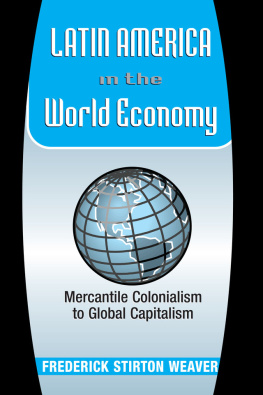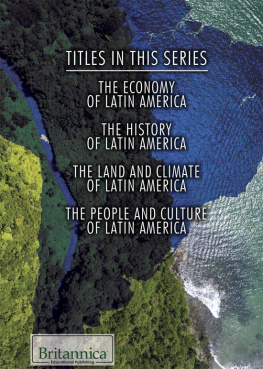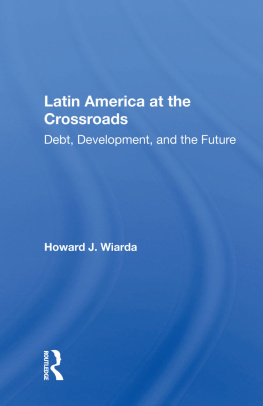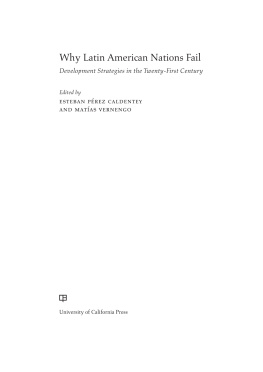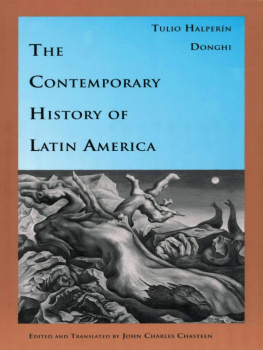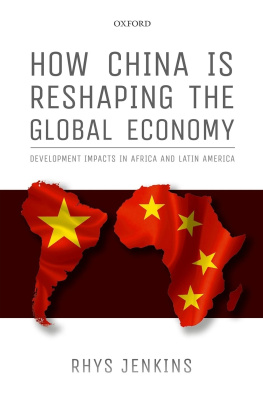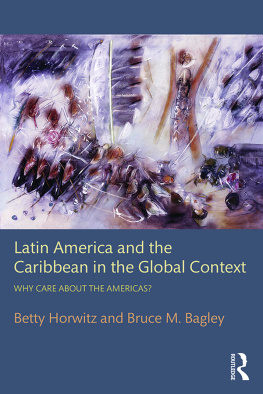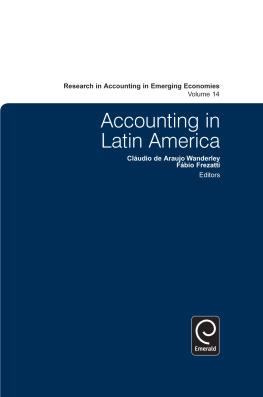Latin America in the World Economy
Latin American Perspectives Series
Ronald H. Chilcote, Series Editor
People's Power: Cuba's Experience with Representative Government, Peter Roman
The Left Strikes Back: Class Conflict in Latin America in the Age of Neoliberalism, James Petras
Indigenous Peoples in Latin America: The Quest for Self-Determination, Hctor Daz Palanco
Capital, Power, and Inequality in Latin America, edited by Sandor Halebsky and Richard L. Harris
State and Society in the Dominican Republic, Emelio Betances
The Battle for Guatemala: Rebels , Death Squads, and U.S. Power, Susanne Jo
Latin America in the World Economy
Mercantile Colonialism to Global Capitalism
Frederick Stirton Weaver
Hampshire College
Latin American Perspectives
First published 2000 by Westview Press
Published 2018 by Routledge
711 Third Avenue, New York, NY 10017, USA
2 Park Square, Milton Park, Abingdon, Oxon OX14 4RN
Routledge is an imprint of the Taylor & Francis Group, an informa business
Copyright 2000 Taylor & Francis
All rights reserved. No part of this book may be reprinted or reproduced or utilised in any form or by any electronic, mechanical, or other means, now known or hereafter invented, including photocopying and recording, or in any information storage or retrieval system, without permission in writing from the publishers.
Notice:
Product or corporate names may be trademarks or registered trademarks, and are used only for identification and explanation without intent to infringe.
Library of Congress Cataloging-in-Publication Data
Weaver, Frederick Stirton, 1939
Latin America in the world economy : mercantile colonialism to global capitalism / Frederick Stirton Weaver.
p. cm.(Latin American perspectives)
Includes bibliographical references and index.
ISBN 0-8133-3809-3 (pbk.)
1. Latin AmericaForeign economic relations. 2. Latin AmericaEconomic conditions. 3. Latin AmericaEconomic policy. I. Title. II. Latin American perspectives. (Boulder, Colo.)
HF1480.5 .W43 2000
337.8dc21
00-039879
ISBN 13: 978-0-8133-3809-5 (pbk)
For my mother
Helen Hamilton Weaver
Contents
by Ronald Chilcote
Many years ago, Frederick Weaver wrote a seminal article on capitalist development in Latin America. Initially appearing in the journal Latin American Perspectives (Fall 1976, 3: 17-53), his essay provided an interpretive overview of imperialism and underdevelopment in the area. Its scope was broad, its interpretation provocative, and its analysis deep. It was widely read and cited by Latin Americanists everywhere. The present volume is an updated and comprehensive amplification of his earlier effort, detailing how his insights continue to reflect historic and contemporary realities throughout Latin America.
The present volume approaches its subject in many ways:
- It synthesizes historical trends in the era of capitalism and competitive capitalism, early industrialization, and changes in the traditional countryside. It goes on to trace the evolution of finance capitalism and the rise of transnational corporations.
- It places past and present political economic history in perspective through its chronological and thematic treatment. It introduces us at the outset to principles and terminology, definitions, and phases.
- It draws from the early experience of capitalism to analyze the difficulty of development in the region. It delves into the strategy of import substitution and its eventual failure in the face of international financial institutions and international competition. It explores the implications of debt, debt leverage, and structural adjustment.
- It weaves an analysis of class forces in urban areas and the countryside.
- It focuses on imperialism in the context of a changing international political economy in an effort to depict the complexity of roles, institutions, and individual motives and attitudes alongside culture, politics, and economy.
- Finally, it looks at the role of US policy and activity, examines the implementation of neoliberal reforms, and identifies the limitations of democracy in the area.
This is the twenty-first volume in Westview Press's Latin American Perspectives Series. It is an important and welcome addition to the classrooms and libraries of academics, students, and community people interested in a reliable and interesting overview of Latin America. It nicely fills a present gap in the literature as it ambitiously overviews developments of relevance to the social sciences and history.
Ron Chilcote
Series Editor for the
Collective of Coordinating Editors
of Latin American Perspectives
The economic and political dynamics within and among nations are significantly different from those even twenty or thirty years ago, and these new dynamics have probably had the most far-reaching effects in Latin America. Although "globalization," that unlovely word, is a useful shorthand, too often it is used to suggest a condition that is inevitable, unique, and due to Technology, the Market, or other transhistorical forces outside the contested terrain of social power. Recent changes do require modifying some previous understandings, but I have written this book because I am convinced that current patterns have developed from prior conditions in ways that can most productively be comprehended by applying some familiar analytical tools to comparative history.
Over half of the book is on the period since 1930 ("the short twentieth century"), but the book's scope encompasses several centuries. It is organized around five historically cumulative phases ( not stages) of political economic change in Europe and the United States. I use several case studies of industrial development to illustrate the changing nature of capitalism and how those changes produced successive phases in the international political economy. Although the imprint of previous phases is always evident, there are discernible patterns in international trade, investment, and politics that reflect dominant nations' then-current needs and interests. The final step is to trace the manner in which domestic Conflicts and power relations within different Latin American nations made the changing international economy a source of new opportunities and problems for domestic groups while showing how the engagement with the international economy affected national struggles and directions of change. Continuing interactions between foreign and domestic forces produced new political economic configurations, and this focus enables one to see why there have been such divergent experiences among Latin American nations and between Latin American and North Atlantic nations.
As noted in the introductory section of Latin America nations. This summary overstates the mechanical and understates complexity, but it serves as a guide to the table of contents and explains the sequence of presentation.
In the book, I am explicit about organizational matters and have been careful to develop analytical points in a manner appropriate for students. For instance, I spend very little time and space directly criticizing other interpretations. Although this is always tempting for an academic, my experience is that students usually regard such discussions as unduly abstract and boring. I therefore make my points in a positive manner by developing my interpretations through historical narratives. Neoliberalism (or neoconservatism) is a partial exception, because it is so thoroughly embodied in recent policies and practices that a critical understanding of it is necessary for comprehending current events and politics.

